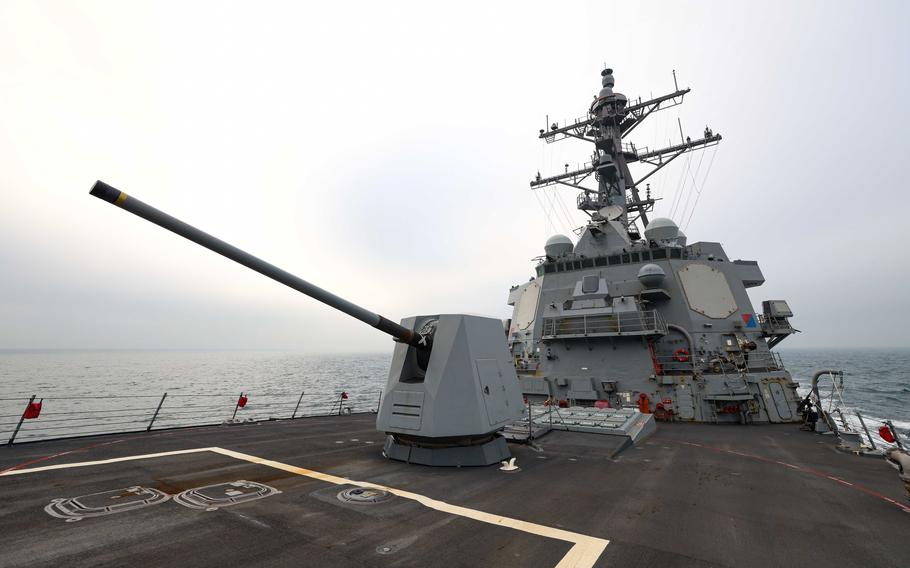
The destroyer USS John Finn conducts routine operations during a Taiwan Strait transit, March 5, 2024. (Justin Stack/U.S. Navy)
In the event that China attempts to consolidate control of Taiwan, USINDOPACOM commander Adm. Samuel Paparo detailed a strategy that may “turn the Taiwan Strait into an unmanned hellscape,” noting that he “can make their lives utterly miserable for a month, which buys me the time for the rest of everything.” According to the interview, the Hellscape strategy includes “deploying thousands of unmanned submarines, unmanned surface ships and aerial drones to flood the area and give Taiwanese, U.S. and partner forces time” to mount a response to a Chinese assault on Taiwan.
The Hellscape strategy appears to be a shaky attempt at deterrence. CIA Director William Burns expressed during an event last year that China may have the capability to consolidate Taiwan by 2027. There may be a sudden urgency in Washington to deter Beijing, and to do so quickly. The Hellscape strategy signals to China that the U.S. may contemplate a military response to a Chinese consolidation of Taiwan and that it’s working on ways to potentially stop that from happening.
Yet, publicizing the Hellscape strategy could unintentionally hasten Beijing’s efforts to gain control of Taiwan. If we assume that China may be ready to consolidate Taiwan by force by 2027, why would its leaders wait until the U.S. has the capability ready to defend it via the Hellscape strategy?
Additionally, the Hellscape strategy doesn’t appear to address how China may attempt to “win without fighting.” For example, “Unrestricted Warfare,” a popular book in China by People’s Liberation Army Cols. Wang Xiangsui and Qiao Liang, advocates for a state to use “all means, including armed force or non-armed force, military and non-military, and lethal and non-lethal means to compel the enemy to accept one’s interests.”
These tactics may be psychological, economic or legal in nature to restrict the U.S.’ policy choices through international law and courts. These tactics are more difficult for the U.S. to counter than a purely military threat since they are complex and fall below the threshold of war. An unintended consequence of publicizing how the U.S. may respond to a military consolidation of Taiwan is that it incentivizes Beijing to further pursue these subversive tactics that the U.S. may not have great answers to.
Most importantly, fitting Paparo’s comments into the U.S.’ longtime policy on strategic ambiguity requires some mental gymnastics. The policy outlines that the U.S. will not outright articulate if it will use military force to defend Taiwan in the event that China attempts to consolidate the island by force. However, the policy dictates that the U.S. maintains the capacity to do so.
Making it as hard as possible for China to seize Taiwan by deploying unmanned drones and submarines is still a roundabout tactic to defend Taiwan, and broadcasting the specifics of the strategy makes it seem more likely than not that the U.S. will come to Taiwan’s aid.
Paparo’s comments don’t seem like a one-off. President Joe Biden has publicly suggested on at least four occasions that the U.S. would militarily defend Taiwan in the event that China consolidates control of Taiwan.
Despite its detractors, strategic ambiguity continues to be a sound policy worth keeping. Strategic ambiguity dissuades Beijing from military action because it keeps China guessing whether the U.S. would intervene in Taiwan, a result that would be costly for the U.S. and China. The U.S. is China’s largest trading partner, accounting for 14.8% of Chinese exports. The economic dependency of China on the U.S. alone deters Chinese leadership from using force against Taiwan as any such action may risk economic consequences that could cripple the country’s economy. Concerns about tension between the U.S. and China have already driven some American companies to seek alternative options. Once the U.S.’ top trading partner, China has been usurped by Mexico and Canada and is now the U.S.’ third largest trading partner.
Strategic ambiguity also signals to Taiwan that intervention by the U.S. is not a given. If the U.S. guarantees that it will come to Taiwan’s defense, Taiwan will have less of an incentive to invest in its own deterrent. Under the current posture, Taiwan is incentivized to prepare for the worst, including through arms sales with the U.S. that are consistent with the Taiwan Relations Act. Additionally, if the U.S. moves toward strategic clarity, Taipei may be less cautious about the prospect of war with China and feel emboldened to adopt policies that could drive war.
While at first blush the Hellscape strategy appears to be an attempt at deterring Beijing, the comments themselves seem to undermine long-standing policy. The relationship between Taiwan, China and the U.S. is incredibly delicate. Efforts to change the current posture should be met with a healthy dose of skepticism.
Demri Scott Greggo is a Contributing Fellow at Defense Priorities.